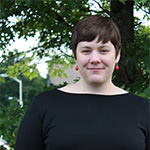
Name: Dr. Jacquelyn Gill
Professional Title: Associate Professor of Paleoecology at the Climate Change Institute and the School of Biology and Ecology at the University of Maine
Education: Ph.D. University of Wisconsin-Madison (2012)
Advisor: Dr. Jack Williams
EG: Have you always been passionate about the environment and climate? Please tell us more about your educational path and what led you to the Department of Geography at UW-Madison.
JG: I’ve always been passionate about the environment. When I was growing up there were concerns about the rainforest, the ozone layer, air pollution, and acid rain, but climate change wasn’t really on my radar until late in college. In 2004, just as I was thinking about graduate school, An Inconvenient Truth came out and that’s when climate change started becoming more present in the general consciousness of the public.
I always knew I wanted to work on environmentalism. I was concerned about the biodiversity crisis in particular. When I was at the College of the Atlantic for undergrad, I had an internship with Vermont Public Interest Research Group, where I quickly decided I did not want to do policy. I realized I wanted to do the science that informs the policy. Around the same time, I was taking courses in conservation, biology, and ecology. The College of the Atlantic is right next to Acadia National Park. Our core undergraduate ecology labs were in the park. Acadia is also this incredible glacial landscape.
For one of our labs, my undergraduate ecology professor took us out to Acadia and we looked at rugged sea cliffs, an iconic Acadia landscape. We stopped in a sea cave, and my adviser said, “Okay, so what’s going on here?” We eventually settled on the idea that this looks like we’re at sea level because it used to be at sea level. It used to be at sea level because the glaciers were once here, and they’re really heavy, and they pushed down the crust. So when the glaciers receded, the land was lower and has been slowly rebounding since. This was like one of those moments in films when someone’s life flashes before their eyes, but instead of my life, it was like the history of the earth. Everything we see right now is the outcome of things that have happened centuries to millennia before. That just hooked me.
So I started reading papers and getting interested in how we reconstruct these past landscapes. We happened to have a visiting instructor who was a geographer, teaching a paleoenvironments class. In the class, we went to Acadia and took a sediment core of a bog. We were looking at layers of brown, organic peat for a while. Then all of a sudden, the core barrel comes out and it was this beautiful blue-gray clay. The professor said, “that’s the last ice age. You can taste it.” You can feel the grittiness of that dusty, dry landscape on your tongue compared to this, soft brown organic mud that just kind of dissolves in your mouth. It seems like a really weird thing to reach down and taste 13,000-year-old mud. But that was the moment where I was like, “I can travel through time, this is the coolest thing ever and this is all I want to do for the rest of my life.” For me, paleoecology allowed me to integrate people, geology, deep time, and change and use all of those things in service to the global change issues that we’re facing now.
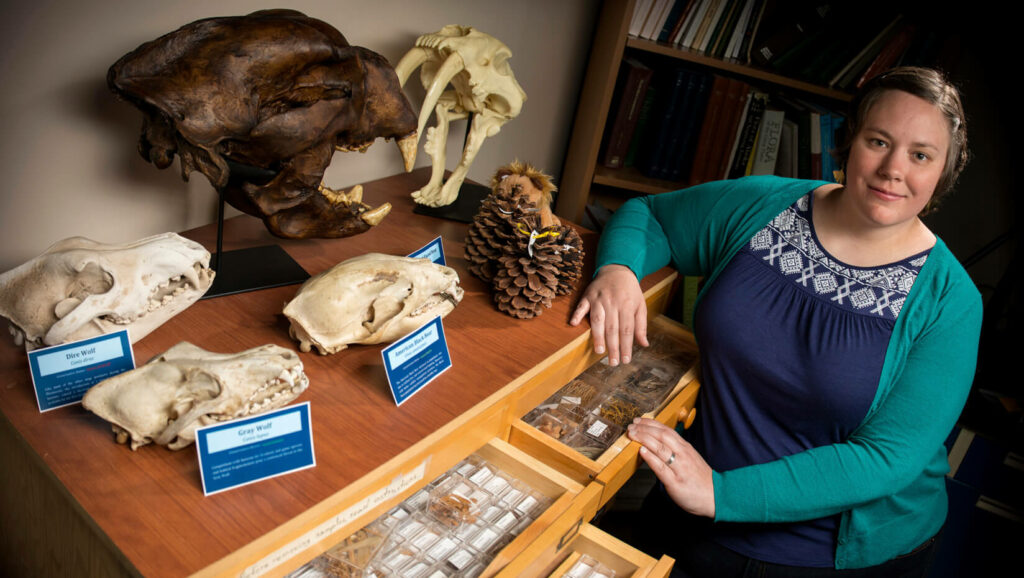
EG: From there, how did you end up at UW-Madison?
JG: It was a really weird confluence of events. My undergrad advisor gave me the advice to read papers and see whose work excites me. I was finding out about all these cool people and I was emailing them and I did not hear back from anyone. I discovered a couple of months later that all of the responses had been going into my spam folder.
Around the same time, I was reading a paper by Jack Williams and there was a part about these late glacial plant communities that have no modern analog. It was a really cool paper. There’s one line in the paper where he says, these no-analog communities existed around the time of the Pleistocene megafauna, but we’ll never be able to really test the role that these animals played in these ecosystems because it’s just too challenging to compare the vertebrate paleontology record with these detailed fossil pollen records that we use to reconstruct vegetation.
I ended up using that sediment core for my honors thesis and I convinced the chemistry professor to let me use the fume hood to do pollen analysis as an undergrad. I taught myself and got slides with pollen on them and did a really basic pollen core for my undergrad thesis. I had just identified this thing that, in the book said, was associated with the dung of herbivores and so when I read Jack’s paper, the next day, I was like, “wait, there’s this fungus that you can use to reconstruct herbivore populations from pollen cores. So you could totally do this thing that Jack is saying we can’t do because we don’t have the tools.” So I got in contact with Jack Williams. He responded and was like, “Hey, great to meet you. Can you fly out to Madison next week and talk about graduate opportunities?” I went out to Madison and had an amazing experience at my interview. It was just so many random things that led me here.
EG: What else during your graduate experience at UW Madison, outside of spontaneously connecting with Jack, helped shape you and eventually lead you to your career as a paleoecologist at the University of Maine?
JG: For me, being in geography helped keep my mind open and allowed me to have a cool broad training and background which has served me well.
My position here at U-Maine is a cross-appointment between the Climate Change Institute and the School of Biology and Ecology. Having that foundation in geography helped and having so many opportunities to train and mentor undergrads in the lab gave me an edge when I was applying to U-Maine. There were so many great experiences at UW-Madison that allowed me to get well-rounded training and that was key.
There’s also a great student body at Madison. I couldn’t have done my thesis or my dissertation without people like Katie Lininger, Jeremiah Marsicek, Grace Schellinger, Dominique Alhambra, and other amazing undergrads who themselves have gone on to really cool careers.
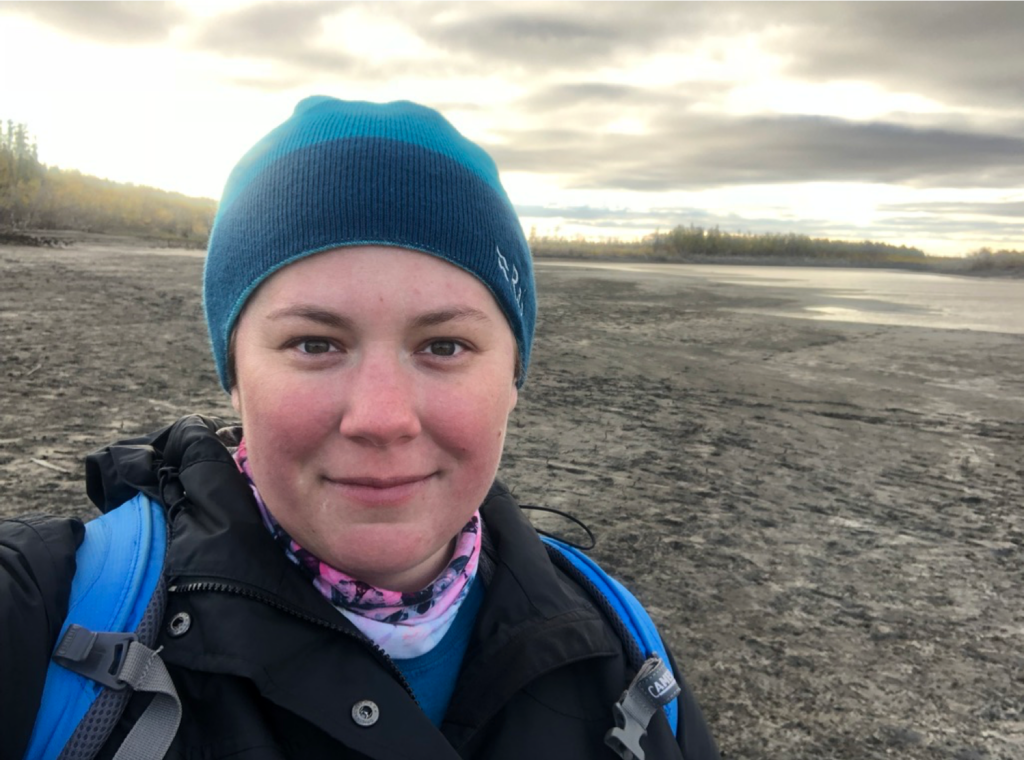
EG: How did you get started on the path of being passionate about science communication?
JG: I’ve always been a communicator in a lot of ways. I did theater in high school and college which served me well when it came time to have to do this in a different sphere.
But then, what did it was my master’s thesis where I used that tool where I talked about those dung fungi, to work on the question that Jack had in his paper. That paper was published in Science and I guess it was a slow news week because the paper got so much press coverage! I think it was also those tiny fungi telling us a story about the extinction of these really big charismatic animals that was just a cool story. I had never talked to journalists about anything. So all of a sudden, I was like, “I gotta get my message right.” There were times when print journalists would completely mess things up, or distort what I said. So I decided I liked audio because at least my words were mine.
I also started becoming more aware of science blogs. Some of the best coverage I got was from some science bloggers. One was Ed Yong, who used to have a blog called Not Exactly Rocket Science. He covered my paper and did the best job of anyone. Then, I joined Twitter a year later and connected with so many other scientists, women scientists, other graduate students, and also peers in my field, who ended up supporting me during my dissertation. This was in the early enough days of Twitter that it was this very productive magical place and it had not become what it is now.
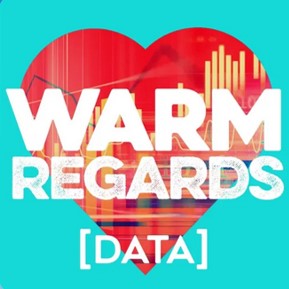
https://warmregardspodcast.com/
From Twitter, I started reading a lot of blogs, and I thought “I could do this, I want to write!” I already had this audience ready to go, so I started blogging. Then I was contacted by the journalist, Eric Holthaus, about starting a podcast with Andy Revkin, so we started Warm Regards. It was one of the first climate podcasts. I’m about to do another podcast, with my friend, Phoebe Cohen. We’re doing a show about the history of the earth and all of the wonderful and completely random moments that lead us to now. It’s a podcast that’s going to be about Earth’s history, but it’s really a way to trick people into realizing that just shooting off to Mars and starting another planet is not an option. We have to take care of one that we have because it’s incredibly rare and special.
EG: You participated in “Let Science Speak: A campaign to support and amplify America’s scientists” and have written a blog post about scientists being proactive (vs. reactive) with the media. Do you think scientists have to work harder than ever before to inform and engage?
JG: I do. I think we have new and different challenges than the ones when I started as a science communicator. I should preface this by saying I do believe that all scientists have a duty, especially publicly funded ones like me, to give back. I know the price tag of my Ph.D. and I’m humbled by the resources that went into making me, as a first-generation college student from a blue-collar background, that got me to this point. So even if we weren’t in the midst of all of these intersecting crises, I think that scientists have a duty or responsibility to give back because we couldn’t do what we do without the public. That’s one of the things that motivates the communication work I do.
Now, we also happen to be amidst intersecting climate and biodiversity crises, public health crises, attacks on reproductive rights, etc, where science can and should have a seat at the table. We need leaders to make evidence-based decisions and that evidence comes from science. At the same time, we live in what some people call a post-truth world, which should be a terrifying phrase to anyone. People believe alternative facts and are manipulated with conspiracy theories about everything. Still, if you look at polling data, scientists are one of the most trusted groups of people in the country. To me, that means we have this opportunity to use our expertise and knowledge for the public good.
Social media and scientists can play a really important role in addressing misinformation and disinformation. We also can play a really important role in inspiring the next generation of scientists. I grew up where my science role models were fictional characters like Ellie Sattler from Jurassic Park or Dana Scully from The X Files. We know from lots of research that representation matters in diversifying science. Not everyone needs to be going out there and starting podcasts but we should be making ourselves accessible and giving back and there are lots of ways to do that. Science communication is just one of those ways.
“The answer is much more complex than turning off your lights.
There’s no buying our way out of the climate crisis.”
-Dr. Jacquelyn Gill
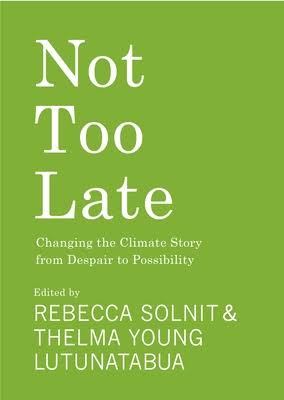
https://www.nottoolateclimate.com/
EG: You have an upcoming essay in “Not Too Late: Changing the Climate Story from Despair to Possibility”…why is it important to have a hopeful outlook on climate change despite all of the controversies previously addressed?
JG: When I say hopeful, I mean hope in the Rebecca Solnit sense of hopeful, so it’s appropriate that she’s one of the editors of this book. Some people see the word hope and think it means that they can just sit back and someone else will fix the problem for them. I think of hope as more of a proactive determination. The belief that regardless of the outcome, we’re still going to work to fight for a better future because the future is uncertain. We can use that uncertainty to motivate our actions because an apocalyptic future is not any more likely than a utopian one.
We have a different problem in science communication than when I started this work in 2009. The problem we were trained to deal with was to convince people that climate change is real and it’s bad. We’ve blown past that and now I see fewer people saying it’s not real and more people saying, especially young people saying, it’s too late. We’re doomed. Nothing we can do matters. We might as well just go build a bunker. I hear so many young people saying, “Will there be a future for me to grow up into?” That terrifies me because that means that as a scientific community, we are not doing a good enough job of road mapping the possibilities and letting people know what they can do. The number one question I get is, “what can I do?” The answer is much more complex than turning off your lights. There’s no buying our way out of the climate crisis.
As science communicators, we need to do a better job of road-mapping ways for people to get involved in climate action on all levels. When I see people checking out, that’s more dangerous than denial to me. Keep believing that your work matters because that is the only way that we get out of this. If we decide in advance that nothing we can do will make a difference, that becomes a self-fulfilling prophecy. If we don’t try, we fail and that’s the worst-case scenario for me.
EG: So we talked a little bit about the new podcast, “Jax and Phoebe Make a Planet”. When is this podcast launching and where can people find it?
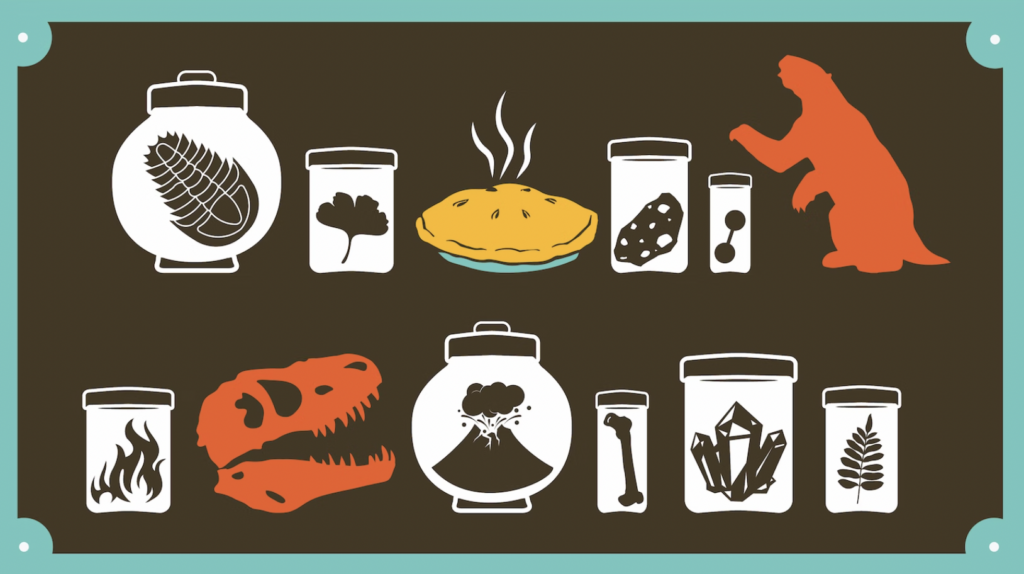
JG: We are hard at work on it right now. We are planning to have it come out sometime by late spring of 2023 and you can find it wherever you get your podcasts. We’re going to put it in as many places as possible. We’re going to keep posting updates to the Kickstarter page, so even if you didn’t contribute, you can still check it and the information will still be there.
EG: We won’t ask you if you prefer Maine or Wisconsin, but what are some of your favorite memories of your time here in the Badger State?
JG: There are so many. I find myself missing lab meetings on the terrace. Being in Science Hall when no one else was there and feeling like I had the whole place to myself. It was this wonderfully quiet and spooky place that was just full of all the ghosts of the people who had done so much amazing work before us. Putting my name on the wall when I left. Wisconsin is a wonderful meeting place where people from all walks of life can come together and it felt very welcoming. I made wonderful friends there and I miss it all the time.
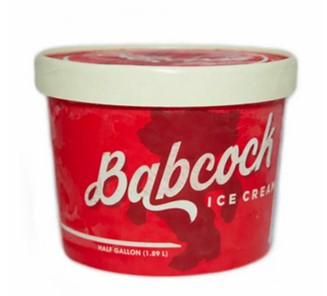
EG: Saving the best question for last, what’s your favorite Babcock ice cream flavor?
JG: That is super easy. It’s Orange Custard Chocolate Chip. Don’t even need to think about it.



